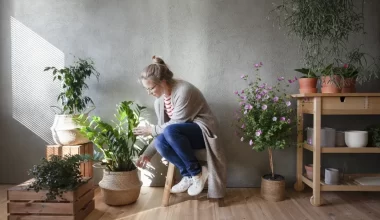Posted on Nov 24, 2023 at 6:01 pm by James A
The greenery and freshness of plants can transform any room into a haven of peace, but this soothing trend raises an important question: are there any health risks to sleeping in a room with plants?
While many indoor gardening enthusiasts advocate for the benefits of plants in purifying the air and improving sleep quality, others are concerned about potential harmful effects.
Table of Contents
The benefits of plants in the house: why have them in your bedroom?
Having plants at home brings numerous advantages, both aesthetically and in terms of well-being. Indeed, plants offer a natural and warm decor and are known for their air-purifying properties. They help to cleanse the air by absorbing pollutants and producing oxygen.
Sleeping in a room with plants may therefore seem like an excellent idea to enjoy these benefits. Some species are particularly suitable for this purpose:
- Aloe vera: this plant purifies the air and releases oxygen at night, promoting restful sleep.
- Chlorophytum comosum (spider plant): it absorbs allergens present in the air, which can be useful if you are prone to allergies.
- Spathiphyllum (peace lily): this air-purifying plant removes toxins from the air and promotes a healthy environment.
Are there any risks to sleeping with plants in your bedroom?
Although plants have undeniable benefits for air quality and well-being, some people wonder about potential risks of sleeping with plants in the bedroom. Here are a few points to consider:
Nighttime carbon dioxide (CO2) production
It is true that most plants produce carbon dioxide at night when they respire and do not perform photosynthesis. However, this CO2 production is generally low and does not have a significant impact on air quality in a well-ventilated room.
In the case where you have many plants or a poorly ventilated room, it may be wise to regularly ventilate to avoid excessive CO2 accumulation.
Allergies to pollen and other substances
Some people may be allergic to pollen or other substances present in certain plants. It is therefore important to choose species that are suitable for your situation and to avoid those that could cause allergic reactions.
If you are prone to allergies, opt for pollen-free air-purifying plants to avoid the risks associated with pollen.
How to integrate plants into your bedroom effectively?
To fully enjoy the benefits of plants while minimizing potential risks, here are some tips to follow:
- Check the specific needs of each plant: some plants require more light, watering, or space than others. Make sure to provide them with optimal conditions for their growth.
- Choose plants suitable for the bedroom: as mentioned earlier, some species are particularly recommended for this purpose. Do not hesitate to seek advice from a gardening specialist or conduct your own research on the subject.
- Regularly ventilate your room: this helps to refresh the air and avoid any accumulation of CO2 or other pollutants.
In conclusion, plants can be an excellent asset for your bedroom, as long as they are well chosen and maintained. Feel free to incorporate these natural elements into your resting space to enjoy a healthier and more pleasant environment.









